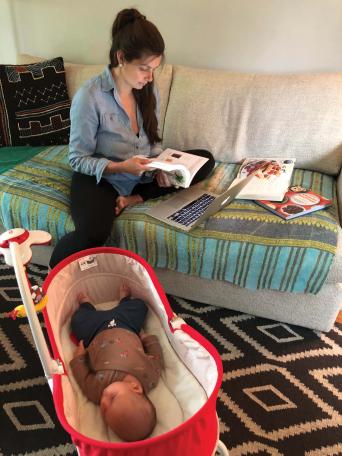
Co-op Members Cope with Pandemic Shopping and Meal Planning

We are all adjusting to new routines during this pandemic, including how we plan our meals and shop for groceries. Between social distancing, empty shelves, and limited options for dining out, the process has gotten a lot more stressful.
Among those hardest hit due to coronavirus are people whose health is compromised, among them older adults and pregnant women.
“I’m 23 weeks pregnant, so I don’t go to the grocery store at all,” said Hannah Datz of Northwest Philly. She used to make regular trips to Weavers Way, Mt. Airy with her two-year-old daughter, Maggie. They were special outings that usually ended with sharing a treat at High Point Café.
Now her husband shops for bulk items at the big stores, buying three-pound packages of hamburger so Hannah can make meatballs for Maggie. “She eats some meatballs and then I freeze the rest,” Hannah said. “We’re two working parents and we used to get what we needed on the run. We can’t do that now. So we buy in bulk.”
Brooke Giles is also juggling a lot, with a two-and-a-half-year-old and an infant born April 1.
“If it wasn’t for Weavers Way, I’m not sure how we would be getting our food, especially in those first few weeks,” she said. “I’m so grateful and impressed by how they’ve adapted to the change.”
Brooke consults her cookbooks and makes a dinner schedule on Google Docs. She creates her shopping list and then, usually on Tuesdays, submits her grocery list to the Co-op for home delivery on Thursday.
“It’s definitely hard when the order comes in and I forgot something that the toddler wants,” she said. Or something that her planning menu calls for.
“They try to substitute but they can’t always,” she added. “I definitely miss going to the store and browsing. Relying on my memory of what they have is challenging. And it’s been tricky to only get groceries once a week.”
For others, navigating the tight aisles in the Mt. Airy store, even with limits on the number of shoppers allowed in the store at one time, is not an option. Adina Abramowitz, who is over 60, and her wife, who is over 70, haven’t stepped inside a grocery store since March 11. Home delivery and curbside pickup are a lifeline for them.
Adina is also grateful the Co-op has a virtual tip jar, so she can show her appreciation for how much the staff is helping people like her. (You can find the virtual tip jar in the Member Center on the Co-op’s website.)
No More Trips
Pandemic grocery shopping means cutting back on shopping from twice a week to once a week, or from once a day to once a week.
“I had no idea how many bananas and pints of blueberries we ate until I had to make sure I got enough during my once-a-week shopping trip,” Kim Pelkey said. She used to stop in the Mt. Airy store every day to pick up fresh produce. It’s just she and her husband and it’s taken three or four weeks to perfect her system of making sure she doesn’t buy too much or too little.
“I’m still trying to figure out the herb thing,” she said. “If I get a bunch of dill for one recipe, I look for more recipes that need dill and make them, so the dill doesn’t go to waste.”
They used to eat out a couple of times a week, so she’s cooking more meals than ever before. “I feel like I’m spending more money on food even though we aren’t eating out as much,” she added.
“Milk. Bread. Butter. Eggs.” Kassie Hughes-Lampros ticks off the items she and wife Brittany Ann Tranbaugh usually run out of between shopping trips. They used to shop about once a week in Mt. Airy. Now Kassie makes a food run to Weavers Way Ambler every other week because she found the Mt. Airy store too stressful. “We try to figure out how long things will last and plan meals to use the foods with the shortest shelf life first,” she said.
Kassie added they are making their snacks now, instead of buying them. “We used to eat a bag of chips with salsa every week,” she said. “Now Brittany bakes bread, cakes and cookies. And I make our own yogurt. We have a tiny refrigerator so we can’t store a lot, but we are making as much as we can.”
She buys a lot of bulk in Ambler, but they don’t always have what she’s looking for and that can be a challenge. “One time they didn’t have the kind of rice that we like so I took what they gave me,” she said. “Another time we couldn’t get regular flour, so we got spelt. A baker-friend of us told how to adjust our bread recipe for the spelt. That was a fun experience.”
People talk about coordinating with their neighbors when someone goes shopping to pick up groceries someone else forgot, which means one less trip to the grocery store. And they’re looking beyond the challenges of this difficult time for other ways the pandemic shopping and meal planning has changed their lives. There are some unexpected benefits.
Hannah and Maggie miss their shopping outings to the Co-op, but they are cooking together and with Hannah travelling less, they are eating together more often as well.
“Maggie is in the kitchen cooking with me. She helps me stir things. That’s helped replace our outings to the Co-op,” she said. “And because my husband and I aren’t rushing around so much because of our work, we’re eating together as a family more, and that’s been a huge joy.”
